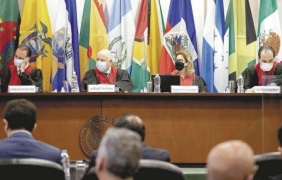After 22 years, the international court declared the Colombian State responsible for the harassment and persecution against the members of the José Alvear Restrepo Lawyers Collective Corporation (Cajar). The DAS was used to monitor them.
On the morning of this Monday, March 18, the Inter-American Court of Human Rights gave the last word in the case that investigated the systematic persecution of the Colombian State against members of the José Alvear Restrepo Lawyers Collective Corporation (Cajar). More than two decades after the case reached the international court, the victims obtained an answer: Colombia was responsible for violating the rights to life, personal integrity, privacy, and at least five other rights. further.
During the reading of the sentence, the Inter-American Court added that the Colombian State violated Cajar’s rights to freedom of thought and expression, to informative self-determination, to know the truth and to judicial guarantees. Also, to judicial protection, freedom of association, free movement, family protection, children’s rights and defending human rights.
You might be interested in: The failure of the Colombian State in protecting social leaders
Within the case that reached the Inter-American Court 22 years ago, 2,000 precautionary measures were decreed for the protection of the life and integrity of the members of Cajar. The group was a victim, as confirmed this Monday by the international court, of acts of violence against its members, such as harassment and threats from the 1990s to the present, in order to stop their work in the defense of human rights.
The most critical point of State violence against Cajar occurred in the 1990s, when through the defunct Administrative Department of Security (DAS) the activities of Cajar members were monitored: their emails, landlines and cell phones, as well as profile its members. These actions against Cajar, as determined by the international court, were completely illegal and did not have any type of judicial control.
Due to the State’s actions against Cajar human rights defenders, several lawyers who were members of the group had to go into exile between 2002 and 2010 to try to safeguard their lives and that of their families. Within the case, these people were also stigmatized by senior state officials, including the President of the Republic, and smear campaigns were launched. The avalanche of threats that these people received and the illegal intelligence that was used against them was also highlighted.




